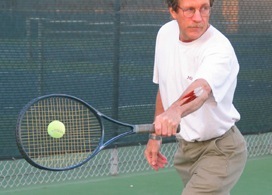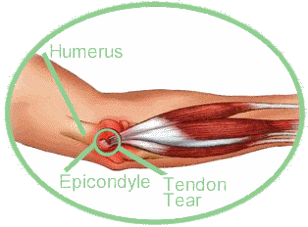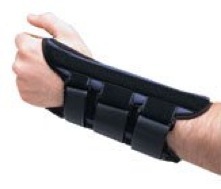 Tennis elbow, or lateral epicondylitis, occurs when the tendons that attach to the lateral, or outside, part of your elbow, get "micro-tears." These tendons attach to the muscles that control extension of your wrist and fingers. When the tendons tear, or degenerate, the body tries to heal these little tears, and pain can result.
Tennis elbow, or lateral epicondylitis, occurs when the tendons that attach to the lateral, or outside, part of your elbow, get "micro-tears." These tendons attach to the muscles that control extension of your wrist and fingers. When the tendons tear, or degenerate, the body tries to heal these little tears, and pain can result.
Tearing can occur from specific trauma to the elbow or from degeneration of the tendons over time. Men and women are affected, usually in the 30s, 40s, and 50s, but tennis elbow can affect people of all ages.
 The primary symptom is pain on the outside of the elbow, arising from the lateral epicondyle of the humerus bone. Tennis elbow symptoms can range from annoying to excruciating pain, and discomfort can occur during specific laborious activity, or even during something as seemingly simple as brushing your teeth or lifting a cup of coffee!
The primary symptom is pain on the outside of the elbow, arising from the lateral epicondyle of the humerus bone. Tennis elbow symptoms can range from annoying to excruciating pain, and discomfort can occur during specific laborious activity, or even during something as seemingly simple as brushing your teeth or lifting a cup of coffee!
 Treatment of tennis elbow is aimed at minimizing and preventing your symptoms. Activity modification is the most important component of treatment. If you are a tennis player, this means modifying your technique; however, most of us affected by tennis elbow are not tennis players! First, limit the activities that aggravate the pain. Often the symptoms occur because we lift too much weight using the small muscles in our forearms. Make an effort to keep your arms close to your body when lifting anything more than a pound or two. This encourages you to use your biceps, triceps, and deltoids-stronger muscles-rather than placing more stress on the ones that already are stressed out! Splints that keep your wrist from moving temporarily or a counterforce brace that is worn against the muscle itself can help rest the muscles; these are available in the first aid aisle at most pharmacies.
Treatment of tennis elbow is aimed at minimizing and preventing your symptoms. Activity modification is the most important component of treatment. If you are a tennis player, this means modifying your technique; however, most of us affected by tennis elbow are not tennis players! First, limit the activities that aggravate the pain. Often the symptoms occur because we lift too much weight using the small muscles in our forearms. Make an effort to keep your arms close to your body when lifting anything more than a pound or two. This encourages you to use your biceps, triceps, and deltoids-stronger muscles-rather than placing more stress on the ones that already are stressed out! Splints that keep your wrist from moving temporarily or a counterforce brace that is worn against the muscle itself can help rest the muscles; these are available in the first aid aisle at most pharmacies.
![]() Stretching exercises offered by your physician or even a physical or occupational therapy program that includes stretching and modalities (heat, ice, massage, ultrasound) can be beneficial. Non-steroidal anti-inflammatory medications such as ibuprofen can provide relief of symptoms. Steroid injections sometimes are used but have risks associated with them that you and your doctor should discuss, along with other possible non-surgical options. Platelet rich plasma is a relatively new treatment that might be beneficial for epicondylitis. Surgery for tennis elbow is a last-resort for patients who have horrible pain that has not been relieved by an extensive non-operative course of treatment.
Stretching exercises offered by your physician or even a physical or occupational therapy program that includes stretching and modalities (heat, ice, massage, ultrasound) can be beneficial. Non-steroidal anti-inflammatory medications such as ibuprofen can provide relief of symptoms. Steroid injections sometimes are used but have risks associated with them that you and your doctor should discuss, along with other possible non-surgical options. Platelet rich plasma is a relatively new treatment that might be beneficial for epicondylitis. Surgery for tennis elbow is a last-resort for patients who have horrible pain that has not been relieved by an extensive non-operative course of treatment.
*See My Friends Tell Me I Have Tennis Elbow...But I Don’t Even Play Tennis!
*For those of you who actually play tennis (!), see a well-respected therapist's Tips for Tennis Players.